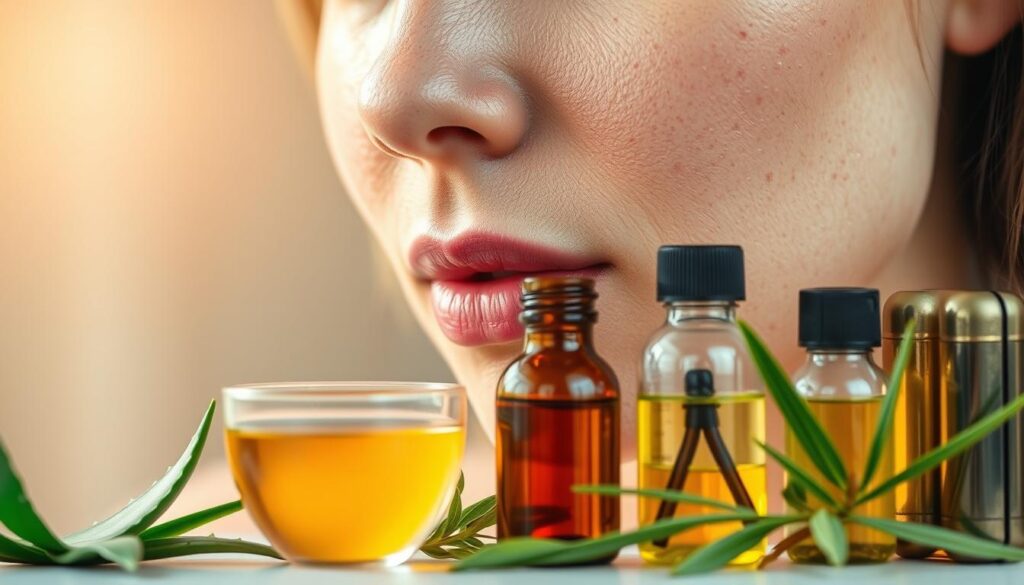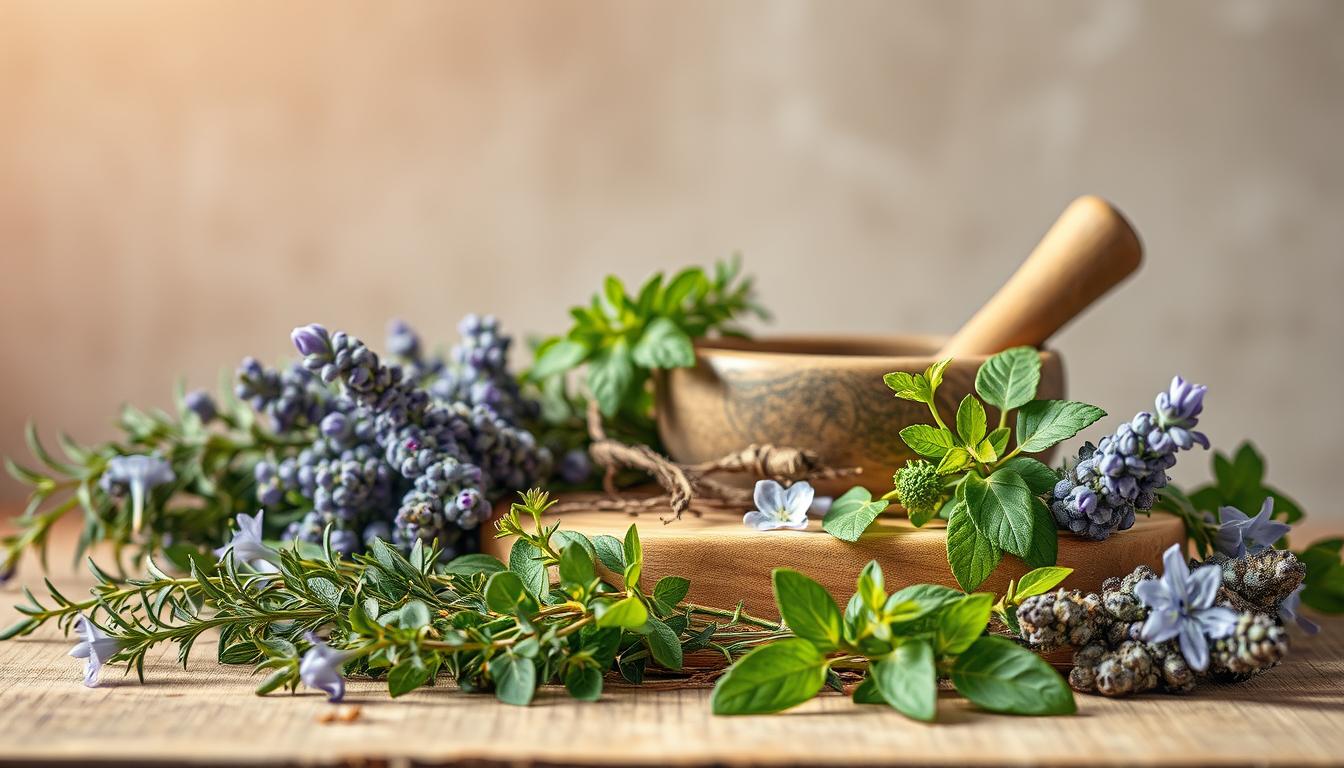Hormonal acne affects millions of women worldwide, causing frustration and distress. A startling 40% of adult women experience acne, with hormonal fluctuations being a significant contributor.
Nature offers a solution to this problem. Certain herbs have been found to be effective in reducing hormonal acne. These natural remedies work by balancing hormones, reducing inflammation, and combating bacteria that cause acne.
By incorporating these herbs into their skincare routine, women can find relief from hormonal acne. The best part is that these remedies are often gentler and more sustainable than conventional treatments.
Key Takeaways
- Herbal remedies can help alleviate hormonal acne.
- Certain herbs balance hormones and reduce inflammation.
- Natural remedies are often gentler than conventional treatments.
- Skincare routines can be enhanced with herbal supplements.
- Hormonal acne can be managed with the right natural approach.
Understanding Hormonal Acne in Women
Understanding the intricacies of hormonal acne is crucial for effective treatment and management. Hormonal acne is a condition that affects many women, often manifesting as persistent and recurring acne, particularly around the chin and jawline.

What Causes Hormonal Acne
Hormonal acne is primarily caused by fluctuations in hormone levels, particularly androgens such as testosterone. These fluctuations can be due to various factors, including menstrual cycles, pregnancy, menopause, or polycystic ovary syndrome (PCOS). The increase in androgens can lead to overproduction of sebum, clogged pores, and ultimately, acne.
How Hormonal Acne Differs from Other Types
Unlike other forms of acne, hormonal acne is closely linked to hormonal imbalances. It tends to appear in specific areas, such as the lower face, and can be accompanied by other symptoms like excessive hair growth or irregular periods. Recognizing these patterns is key to distinguishing hormonal acne from other types and guiding appropriate treatment, including herbal remedies for hormonal imbalances.
How Herbs Can Help Balance Hormones
Balancing hormones is key to managing acne, and certain herbs have been found to be particularly effective in this regard. Herbal supplements for hormonal acne offer a natural approach to regulating hormonal imbalances that can lead to acne.
The Science Behind Herbal Remedies for Skin
Herbal remedies have been used for centuries to treat various skin conditions, including acne. The science behind these remedies lies in their ability to balance hormones, reduce inflammation, and combat bacteria that can cause acne. For instance, certain herbs like Spearmint and Chasteberry have been shown to have anti-androgenic effects, helping to regulate hormonal imbalances that contribute to acne.
Some of the key benefits of using herbal remedies for skin include:
- Regulation of hormonal imbalances
- Reduction of inflammation
- Antimicrobial properties to combat acne-causing bacteria
Benefits of Natural Approaches vs. Conventional Treatments
When it comes to treating hormonal acne, conventional treatments often involve antibiotics, retinoids, or hormonal therapies, which can have significant side effects. In contrast, natural approaches using herbs can offer a gentler alternative with fewer side effects. For example, Green Tea is rich in antioxidants and has anti-inflammatory properties, making it an effective natural remedy for acne.
The benefits of natural approaches include:
- Fewer side effects compared to conventional treatments
- A more holistic approach to health, addressing the root cause of acne
- The potential for long-term skin health improvement
Top Herbs for Hormonal Acne in Women
The struggle with hormonal acne is real for women, and while conventional treatments are available, some are turning to herbal remedies for relief. Herbal supplements have been used for centuries to address various health issues, including skin problems like acne. Here, we explore some of the most effective herbs for hormonal acne.
Spearmint
Spearmint is known for its anti-androgenic effects, which can help reduce hormonal acne. Studies have shown that spearmint tea can decrease levels of free testosterone and increase luteinizing hormone and follicle-stimulating hormone, which can help balance hormonal imbalances that lead to acne.
Saw Palmetto
Saw palmetto is another herb that has been studied for its potential in treating hormonal acne. It works by inhibiting the conversion of testosterone to dihydrotestosterone (DHT), a potent form of testosterone that can contribute to acne. By reducing DHT levels, saw palmetto may help alleviate acne symptoms.
Chasteberry (Vitex)
Chasteberry, also known as Vitex, is a popular herbal remedy for hormonal imbalances. It is believed to influence the pituitary gland, which in turn can help balance hormonal levels, potentially reducing acne. Chasteberry is often used to treat premenstrual syndrome (PMS) symptoms, including acne.
Green Tea
Green tea is rich in antioxidants and has been shown to have anti-inflammatory properties, which can help reduce acne. The catechins in green tea may also help reduce sebum production, further alleviating acne symptoms.
Evening Primrose Oil
Evening primrose oil is rich in omega-6 fatty acids, particularly gamma-linolenic acid (GLA), which can help reduce inflammation and promote healing. It is often used to treat various skin conditions, including acne.
Here’s a summary of the benefits of these herbs in a tabular format:
| Herb | Benefits |
|---|---|
| Spearmint | Reduces free testosterone, balances hormonal imbalances |
| Saw Palmetto | Inhibits conversion of testosterone to DHT |
| Chasteberry (Vitex) | Balances hormonal levels, reduces acne |
| Green Tea | Anti-inflammatory, reduces sebum production |
| Evening Primrose Oil | Reduces inflammation, promotes healing |
These herbs offer a natural approach to managing hormonal acne, providing women with alternative or complementary options to conventional treatments.
Anti-Inflammatory Herbs for Acne Relief
For individuals suffering from acne, certain anti-inflammatory herbs can provide relief and help balance the skin’s natural processes. Inflammation is a significant component of acne pathology, and reducing it can lead to fewer breakouts and less severe symptoms.
Several herbs have been identified for their anti-inflammatory properties, which can be beneficial in managing acne. These herbs not only help in reducing the inflammation but also promote overall skin health.
Turmeric
Turmeric contains curcumin, a compound known for its potent anti-inflammatory and antioxidant properties. It can help reduce acne by combating inflammation and preventing bacterial growth. Turmeric can be consumed internally or applied topically.
Calendula
Calendula is known for its soothing effects on the skin. It has anti-inflammatory properties that can help calm irritated skin and promote healing. Calendula can be used in creams, salves, or as a infused oil for topical application.
Chamomile
Chamomile is another herb with anti-inflammatory properties that can soothe acne-prone skin. It can help reduce redness and irritation, promoting a more even skin tone. Chamomile tea can be consumed or used as a topical treatment.
Burdock Root
Burdock Root is rich in antioxidants and has been traditionally used to treat various skin conditions, including acne. It helps purify the blood and reduce inflammation, which can lead to clearer skin. Burdock root can be consumed as a tea or supplement.
| Herb | Key Benefits | Usage |
|---|---|---|
| Turmeric | Anti-inflammatory, Antioxidant | Internal consumption or topical application |
| Calendula | Soothing, Anti-inflammatory | Topical application |
| Chamomile | Anti-inflammatory, Soothing | Internal consumption or topical application |
| Burdock Root | Antioxidant, Blood purifier | Internal consumption |
How to Use Herbs for Treating Hormonal Acne
To effectively use herbs for hormonal acne, it’s crucial to know the different consumption and application methods. Herbs can be utilized in various ways to treat hormonal acne, offering a natural approach to skincare.
Internal Consumption Methods
Internal consumption involves ingesting herbs to balance hormones and reduce acne from within. This can be achieved through various methods.
Teas and Infusions
Herbal teas, such as those made from Spearmint or Green Tea, are popular for their ease of use and effectiveness. Drinking these teas regularly can help in reducing hormonal acne.
Supplements and Tinctures
For those who prefer a more concentrated dose, supplements and tinctures are available. Saw Palmetto and Chasteberry are commonly used in supplement form to address hormonal imbalances.
Recommended Dosages
It’s essential to follow the recommended dosages for each herb to ensure efficacy and safety. Consulting with a healthcare professional is advised to determine the best dosage.
Topical Applications
Topical applications involve directly applying herbs to the skin to reduce acne and inflammation. This method can provide immediate relief and promote healing.
Herbal Face Masks
Face masks made from herbs like Calendula and Turmeric can soothe and heal the skin. These masks can be used once or twice a week for optimal results.
Herbal Steam Treatments
Steam treatments with herbs such as Chamomile can open up the pores and cleanse the skin deeply, reducing acne.
Herbal-Infused Oils
Oils infused with herbs like Evening Primrose can be used to moisturize and nourish the skin, reducing inflammation and promoting healing.
By combining internal consumption methods with topical applications, individuals can effectively use herbs to treat hormonal acne, promoting clearer and healthier skin.
Creating a Holistic Herbal Skincare Routine
Incorporating herbal remedies into your daily skincare routine can help balance hormones and reduce acne. A holistic approach combines internal and external treatments to achieve optimal skin health.
Morning Routine
Start your day with a gentle herbal cleanser, such as one infused with Calendula or Chamomile, to soothe and clean the skin. Follow with a toner containing Spearmint or Green Tea to help balance hormones and tighten pores.
Evening Routine
In the evening, use a gentle exfoliant containing Turmeric or Burdock Root to remove dead skin cells and promote skin renewal. Then, apply a nourishing herbal moisturizer to hydrate and protect the skin.
Weekly Treatments
Once a week, treat your skin to a herbal face mask or an overnight treatment containing Chasteberry or Evening Primrose Oil. These treatments can help reduce inflammation and promote hormonal balance.
By integrating these herbal remedies into your skincare routine, you can create a comprehensive approach to managing hormonal acne and achieving healthier, clearer skin.
Lifestyle Factors That Complement Herbal Treatments
While herbs play a crucial role in managing hormonal acne, lifestyle factors can further support their efficacy. A well-rounded approach that includes dietary adjustments, stress management, and healthy habits can enhance the benefits of herbal remedies.
Diet Considerations
A balanced diet rich in fruits, vegetables, and whole grains can help regulate hormones and reduce acne. Limiting processed foods and sugars is also beneficial. Incorporating foods high in omega-3 fatty acids, like salmon, can help reduce inflammation.
Stress Management
High stress levels can exacerbate hormonal imbalances. Techniques such as yoga, meditation, and deep breathing can help manage stress. Regular practice can lead to improved hormonal balance and reduced acne.
Sleep and Exercise
Adequate sleep and regular exercise are crucial for overall health and can positively impact hormonal balance. Aiming for 7-8 hours of sleep and engaging in moderate exercise can help regulate hormones and improve skin health.
Conclusion
By incorporating holistic herbs for hormonal acne into your skincare routine, you can effectively manage and reduce acne symptoms. Herbal skincare for hormonal acne offers a natural and gentle approach to achieving healthy, balanced skin.
As discussed, various herbs such as spearmint, saw palmetto, and chasteberry have shown promising results in balancing hormones and reducing acne. Combining these herbs with a healthy lifestyle, including a balanced diet, stress management, and regular exercise, can enhance their effectiveness.
By adopting a holistic approach to skincare, you can move beyond just treating symptoms and work towards achieving overall skin wellness. Explore the natural remedies discussed in this article and start your journey towards healthier, clearer skin.
